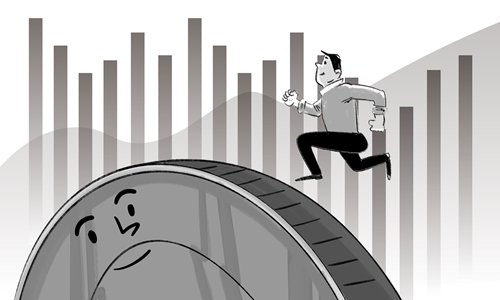HOME >> BUSINESS
China’s financial opening-up has righteous motives despite Western skepticism, distortion
By Zhao Xijun Source:Global Times Published: 2019/7/31 22:10:35

Illustration: Luo Xuan/GT
Recently, China announced a slew of measures to further open its financial market. The 11 new measures encourage overseas financial institutions to participate in the establishment of, and invest in, asset management subsidiaries of commercial banks. They also allow them to set up and invest in pension management companies. Investment restrictions of overseas personal insurance companies will be completely scrapped in 2020. Those measures serve as a milestone, marking a new stage of China's financial opening-up.
The financial opening-up has two aspects. One opens financial institutions and the other frees up capital flows in and out. So far, China has been making steady progress on both aspects in spite of industry differences. Overall, the general direction is in line with opening-up. Eventually the free movement of institutions and capital will be achieved. What is impossible to avoid is the risks that come with openings of both aspects.
On the institutional level, opening-up will bring competition and regulation pressure for domestic institutions. Freer flow of capital could cause broader risks - market price fluctuation and financial market volatility - and those exogenous shocks often transmit more fiercely.
China has taken the bigger step of opening-up on the institutional level, which was mentioned during the WTO negotiations. Insurance and banking sectors are already open. As long as they obey Chinese laws and regulations, foreign investors can come in and establish insurance companies and banks.
Restrictions still exist in some areas, such as securities and funds. The new measures have lifted limitations in these areas, either in terms of foreign investment holding ratios or moving dates forward. More industries such as professional services, bond rating, consultancy and monetary brokerages have all been opened.
On the capital aspect, the opening-up is mainly centered on projects. The country attempted to issue B shares to attract capital, then gradually issued H shares to help Chinese companies list overseas and bring overseas investment back in. In the financial sector, China has promoted opening-up through programs such as Qualified Foreign Institutional Investor, Qualified Domestic Institutional Investor, Renminbi Qualified Foreign Institutional Investor and Renminbi Qualified Domestic Institutional Investor.
It has also been pushing forward the opening via trading programs such as Shanghai-Hong Kong Stock Connect, Shenzhen-Hong Kong Stock Connect, bond connect and Shanghai-London Stock Connect. One of the measures mentioned to further facilitate the interbank bond market will prompt more overseas investors to purchase Chinese bonds and make risk and portfolio management more sound. This measure is particularly valuable for overseas institutional investors.
Western media barely paid attention to these opening measures despite their great significance. To make matters worse, they have drawn connections between the accelerating opening-up of the financial market and economic stimulus, or inferred that the opening-up is simply to absorb trade war impact. They have even warned foreign investors to "proceed with the utmost caution."
Some Western countries, led by the US, have been headed toward isolation and unilateralism. The Trump administration has pulled out from multiple international organizations. Brexit will isolate the UK from globalization. Populism has been rising in some other Western countries.
US policymakers believe globalization has not been benefiting the US. Against this backdrop, Western media is not focused on opening-up anymore. The negligence and distortion of China's financial opening-up measures are the result of Western countries' political ideological changes.
Opening-up has a positive effect on economic development. A country opening up and embracing the outside world should not be seen as dubious or of lacking righteous motives. The US couldn't have developed rapidly after World War II without implementing opening measures. Multinational corporations couldn't have made huge profits without them. Consumer products in the US couldn't have been priced so low so as to benefit the entire society.
China is the only country that has not experienced major financial crises. The country is also the main contributor to the global investment market. China has led the world in wealth growth, the investment market, resident deposits and other financial sectors. According to the Global Wealth 2018 report released by the Boston Consulting Group, personal wealth in Asia grew by 19 percent to $36.5 trillion, with Chinese residents holding 57 percent of that total.
The 40 years of reform and opening-up have created a high-speed growth of the Chinese economy and the fast improvement of household income and the standard of living. China and its people have fully enjoyed the benefits brought by opening-up and are willing to continue this process. Meanwhile, China hopes to promote this experience to other developing countries to benefit their economies. Further opening-up will bring about more efficient resource allocation and dividends. While the industrial chains and other value chains that can boost economic development have formed and operated effectively, no country can do everything in isolation and without cooperation.
The author is deputy director of the Financial and Securities Research Institute, Renmin University of China. bizopinon@globaltimes.com.cn
Posted in: EXPERT ASSESSMENT